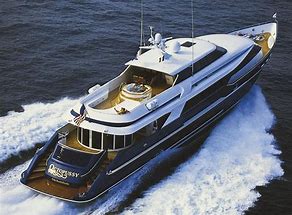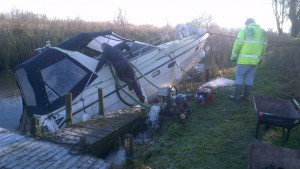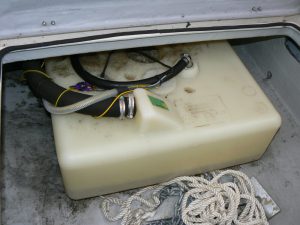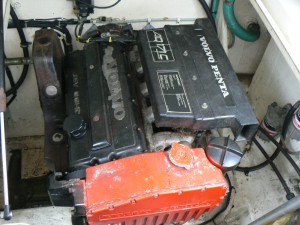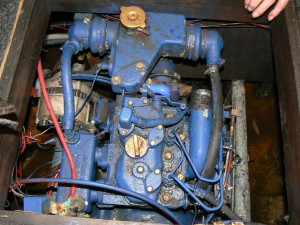Peters & May urge boat owners to think Brexit and VATNovember 23, 2020
Marine transport and logistics provider, Peters & May, is reminding UK boat owners with vessels outside the UK that, as the Brexit transition period comes to an end, the rules determining boats’ VAT status will be subject to change.
The latest information available from HMRC is that, from 1st January 2021, the rule that yachts must return to the UK within three years of having last left the UK/EU in order to be entitled to Returned Goods Relief (RGR) on duty and VAT will be strictly enforced.
“Whether RGR is applicable will be dependent on it not having undergone any repairs whilst outside the EU that increased its value when it last left the UK/EU and the amount of time it has been overseas, the date of its reimport into the UK and whether the place from where is it returning is inside the Customs Territory of the EU,” says Adam Towgood, sea freight and customs manager. “In order to claim the VAT relief element of RGR, it must also have not changed ownership since it last departed. Where a boat does not meet RGR criteria, duty and VAT will be payable to HMRC upon reimport.”
HMRC has recently announced the grant of a 12-month extension exclusively for boats that are currently within the EU, having departed the UK before 31st December 2017. These now have until 31st December 2021 to be reimported to the UK and claim RGR.
“To ensure that there is no VAT payable to HMRC on the reimportation of their boats we are urging UK boat owners to take early action. Owners need to be aware of the dates of their boats’ movements and time away from the UK and act accordingly to claim Returned Goods Relief,” says Towgood.
Peters & May says it has availability on sailing schedules from the Med which will arrive in the UK before the end of December 2020. The company says an integral part of its yacht transportation service is the completion of complicated paperwork on behalf of the owner.
Acknowledgement to Marine Industry News
For more information contact European Marine Services Ltd.
Marine Surveyors & Consultants | ADR Mediation | Expert Witness
www.europeanmarinesurveys.com
Tel: (44) 01603 327 123
Winters’ here – Problems with Water in Fuel TanksNovember 22, 2016
Water gets in to fuel tanks in many different ways, through access ports and filler caps with faulty/damaged seals, tank vent breathers and from external sources such as re-fuelling bulk tanks and containers and Such as above – bad parking
Boat owners do not use their boats in the same way as they use their cars. Many boats are laid up for long periods particularly through the winter months. One of the main causes of fuel related issues is water contamination.
Water contamination is the starting point for bacterial growth, commonly known as ‘diesel bug’ and once in the system it can take some extensive and sometimes expensive work to get rid of it.
Of all the users of diesel fuel the operators of boats are the most likely to encounter problems with water contamination, fungus and bacteria for the following reasons:-
- Boats operate in a wet environment and it is not always possible to stop water seeping into fuel tanks.
- The fuel tanks on boats are designed to fit into restricted or unusually shaped areas to make the best possible use of available space. This can mean that they can be difficult to drain and often have areas where free water can collect and sit undisturbed.
- The fuel tanks contain baffles to stop the fuel sloshing about. The baffles can trap free water in small pockets.
- In warmer climates boats operate in areas with high humidity. Water in the air enters the boat tanks through the breather and condenses inside the tanks.
Where free water is present it will provide a site for fungus and bacteria to grow. Often the fungus or bacteria will develop for a long time without causing any problems until one day they become disturbed and stirred up into the fuel. This will be noticed when filters start blocking with a black slime which is the dead matter from the fungus and bacteria. The fungus can be stirred up by:-
- Vigorous movement due to re-fuelling, waves, rough sea or a storm, etc.
- The fungus population reaches a size at which it grows and spreads into the rest of the fuel.
- The natural life cycle of the fungus reaches a point at which dieback occurs and dead matter floats in the fuel.
- The fungal activity reaches a point at which natural surfactants produced by the fungus cause water and dirt to be suspended in the fuel and the fuel becomes hazy.
PREVENTION:
On land the normal prevention of fungal problems is to regularly drain any water in which the fungus can grow. This may not be possible in most boats because the fuel tank shape does not provide a common draining point for all water pockets. An effective method of removing free water and preventing any build-up of water is to insert an Aqua-Zorb cell in to the tank. These cells will absorb the water and are easily inserted through the filler cap and removed the same way. Aqua-Zorb cells are available in a large range of sizes and are suitable for small tanks and for all sizes of bulk storage tanks.
To prevent water getting in through the tank breather then consider fitting a Des-Case Desiccant Breather, these absorb moisture from the air as it is drawn in to the tank and also absorb moisture when air is expelled from the tank.
Consider regular treatment with a biocide or fuel treatment. The biocide should be one that can be added to the fuel that kills the fungus and stops it growing in the water. An example of effective biocides is Marine 16.
 All products are available from FA-ST Filtration Analysis Services Technology Ltd Tel: 01246268900 or e-mail [email protected] or visit www.fa-st.co.uk for more details or buy on line at www.oilsampling.co.uk
All products are available from FA-ST Filtration Analysis Services Technology Ltd Tel: 01246268900 or e-mail [email protected] or visit www.fa-st.co.uk for more details or buy on line at www.oilsampling.co.uk
FA-ST Ltd is actively looking for more distributors throughout the UK, Europe & Worldwide for their products and services.
For more information contact European Marine Services Ltd. Marine Surveyors & Consultants
EMS also undertake Boat Safety Inspections
Tel : 01603 327 123 www.europeanmarinesurveys.com
Outboard Engine Storage – Winter 2014 / 15November 7, 2014
OUTBOARD STORAGE – Winter 2014 / 15 FROM MARINEPOWER BRUNDALL
Need somewhere secure and dry?
Don’t want to have to find space at home, work or hide it on the boat?
MarinePower can help!
We can store your outboard here at our marina over the winter in our new outboard storage area, located in our main Office/Workshops building keeping it warm, dry and secure*.
For as little £1 per week we can give you peace of mind and save you the hassle of finding space by securely storing off site, we’ll even cap your storage charge to a maximum of £15 for the winter **.
WINTER OUTBOARD SERVICING
Why not have your outboard serviced while it’s in storage – ready for the new season – and we’ll throw in the Winter Storage free of charge! ***
A typical annual service on 4hp-15hp is around £95-£175 including parts & labour ****.
BOOK TODAY
Reply to [email protected] or call 01603 717525 to book and as an additional offer for early bird bookings we’ll waive any storage fees for outboards received before 1st November.
* Outboards to be dropped off at MarinePower workshop. Additional arrangements can be made to collect if required. Removal/disposal of fuel may incur a charge.
** Winter period considered to be 1st November – 31st March. Weekly rate will apply outside these dates.
*** Winter servicing must be booked in/completed before 28th February to qualify for free storage. Free of charge period only applies to 1st November- 31st March. Weekly rate will apply outside these dates.
**** Assumes normal servicing parts/labour required only. Different makes may incur different parts pricing. Additional parts/labour may be required on inspection.
All prices shown subject to VAT. Further terms and conditions may apply.
Marine Engine Oil Analysis | What is it | BenefitsJune 16, 2014
Marine Engine Oil Analysis – Recommended at time of Pre Purchase Inspection
Engine Oil Analysis – To be recommended at time of a Pre Purchase Survey, certainly on all motor boats where the engine is more than about ~ 10-15 years of age (and/or) where the hours are quite high (and/or) where there is no complete service record
To protect yourself from potentially expensive repairs why not get an engine health check at the same time as the pre purchase survey inspection.
Remember without an engine your boat goes no where
Engineering & Oil Inspections – Marine Oil Analysis carried out to ISO 9001: 2008 standards
Engine(s) visual ONLY inspections are carried out on yachts and power boats
As surveyors (not technical engineers) we visually inspect marine engines and generator installations during our inspections, and where possible the engine is run up to access its general running characteristics, vibration levels etc. No dismantling of the engine or associated equipment is carried out within the scope of a condition survey so no detailed comment upon the internal parts is possible.
As we are unable to comment on the internal condition of the engine(s). It is therefore always strongly recommended that the engines(s) are examined and further tested by a competent marine engineer familiar with the make and type of machinery installed.
On larger power vessels the engine represents a large part of the vessels value and is fundamental to safety. The above visual examinations will be carried out where possible but we will probably recommend a full engine trial to put the engine(s) through their paces.
On most engines, oil analysis may be a worth while investment as it can tell a trained marine engineer a lot about the engines internal condition.
Fee £ 95.00 inc per engine sample analysis (less £15 if undertaken at same time as vessel inspection)
It represents very good value compared with the cost of rectifying damaged engines.
Oil Analysis is one of the most useful and important maintenance support programs available.
- Detects problems early, so actions can be taken before they become major failures.
- Helps schedule downtime to fit the workload.
- Monitors positives as well as negatives, so you won’t have to pay for repair of components that are not worn out.
- Allows you to monitor maintenance schedules to verify that routine maintenance has been performed.
- Enables you to better manage budgets by predicting repairs, downtime, and equipment life.
- Helps you develop a complete service history for each machine. This proves invaluable when evaluating performance and planning replacement purchases.
- Documents service history for a higher price at trade-in or sale.
For maximum protection, you need oil sampling for all major oil lubricated systems (engine, transmission, hydraulic system and final drives) and coolant sampling for your cooling systems. By pinpointing trouble early, you can avoid unplanned repairs or catastrophic failures.
Our Marine Engine Oil Analysis Laboratory operates to ISO 9001:2008 standards and meets all manufacturer warranty requirements. The Laboratory can provide analysis for all types of synthetic, mineral & bio-degradable oils ,engine oils, gas engine oils, hydraulic oils, transmission oils, gear oils, transformer oils, coolants, grease, cutting fluids, water based oils, glycols emulsions, diesel fuel, fuel and biodiesel etc.
For more detailed information on Oil Analysis Samples Visit
For more information contact European Marine Services Ltd. Marine Surveyors & Consultants
EMS also undertake Boat Safety Inspections & Engine Inspections
www.europeanmarinesurveys.com
Tel: 01603 327 123
OIL SPY – Pre Season PreparationMarch 26, 2014
Marine Surveyor – Recommendations
Hi There – Boat Owners
In this blog European Marine Surveys are offering advice for Pre-Season Preparation
OIL SPY
Ideal pocket – toolbox tool for immediate results. For all marine enthusiasts whether commercial users, hire fleet operators, private boat owners …..in fact any powered vessel. Most owners know their engines and our OILSPY test will help you to fully understand what is going on internally in your engine.
This is not a replacement for laboratory oil analysis but an additional tool for instant ‘on site’ visual results. Advance notification of any oil deterioratiobn is a certain method of safeguarding your engines from any possibility of component or lubrication breakdown/failure.
If you are thinking of buying or selling a boat then an instant test can give you a good indication of oil condition and will help in identifying coolant leaks, fuel dilution, oxidation, sediment, sludge formation and wear debris. Each boxed kit contains 20 test cards. Consider taking your boat for an engine service……take a test before and after……..was the engine flushed and the oil changed….OILSPY can tell you. Buying a used boat…take a test run, take the OILSPY test……you only need a drop of warm oil from the dipstick to give you peace of mind on engine condition
Oil Spy – For less than £ 26.00 per box (plus P&P) of 20 test cards
For more information contact European Marine Services Ltd (inc European Marine Surveys) 01603 327 123 end_of_the_skype_highlighting www.europeanmarinesurveys.com
Diesel Fuel Treatment in Boats – Recommendations
Hi There – Boat Owners
In this blog European Marine Surveys are offering advice for Pre-Season Preparation
Diesel Treatment
There are known to be over 20 species of fuel bugs that can contaminate your fuel storage tank. If the conditions are suitable they ‘move in’ and start to multiply. The fungal spores are carried by air and water, entering your fuel system via filling ports and vents. The air space above the fuel in tanks contains water vapor. The walls of the tanks are cool and the water vapor condenses on these surfaces. This water subsequently accumulates and sinks to the bottom of the tank creating an ideal environment for the growth of the most common of fungi “Cladisporium Resinae”. Once in a fuel supply this contamination can exist virtually undetected and wait for the right conditions for growth. They can double their numbers every 20 minutes and one single spore can produce over 260,000 cloned descendants in six hours. Each spore lives for about 48 hours and as older fungi die their bodies accumulate, forming a slime that ultimately floats upwards into the fuel, a bit like soft candy floss so it doesn’t take long for the fungi to dominate the entire fuel system.
Diesel Bug Test Kit – The individually packed Marine 16 diesel bug test-kit can be used to check for microbial contamination of diesel fuels in boats, storage tanks, home heating fuels etc. Contains full instructions of use, results in approx 3-4 days One test per kit. We can in addition provide a full oil & fuel laboratory analysis service including bug/bacteria testing for all types of industries.
Diesel Bug Treatment – Is specifically designed to prevent and eradicate diesel bug contamination. It will disperse into both fuel and water phases and will remain active in the fuel for over a year. As you use the treated fuel it will eliminate growth throughout the fuel feed system.
Diesel Bug Treatment – For as little as £12.00 you can treat a full tank of diesel
For more information contact European Marine Services Ltd (inc European Marine Surveys) 01603 327 123 www.europeanmarinesurveys.com



